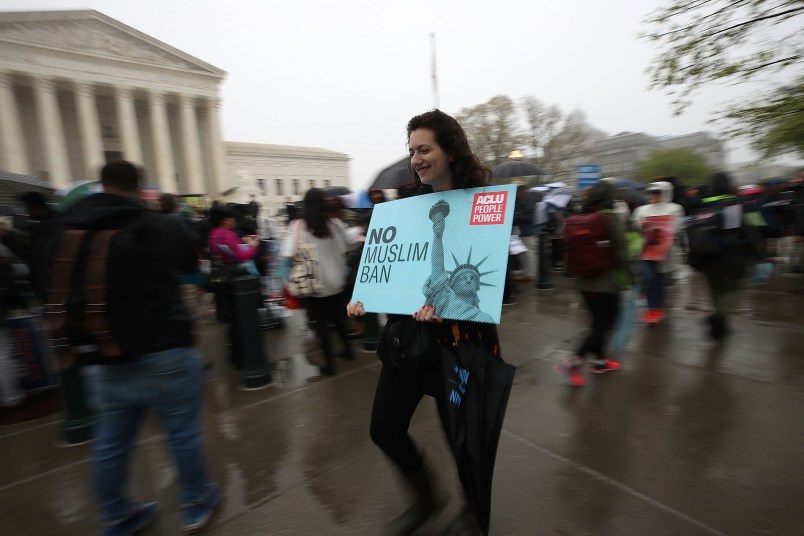WASHINGTON, D.C. — In weighing the constitutionality of President Donald Trump’s travel ban in highly-anticipated oral arguments Wednesday morning, the Supreme Court Justices returned repeatedly to the question of whether Trump’s executive order trampled on Congress’ right to set immigration policy.
On both the question of Separation of Powers and whether Trump’s anti-Muslim tweets “tainted” the legal rationale for the travel ban, the justices seemed to split along predictable ideological lines, with progressive Justices Ruth Bader Ginsberg, Elena Kagan, and Sonia Sotomayor taking the lead in asking the toughest questions of the Trump administration and conservative Justices Samuel Alito and Neil Gorsuch and Chief Justice John Roberts grilling the travel ban’s challengers. Justices Anthony Kennedy and Stephen Breyer were more reserved, expressing skepticism toward some of the administration’s claims but not revealing a clear desire to strike down the ban. As usual, Justice Clarence Thomas remained silent.
While no certain five-vote majority was apparent from the arguments either in support of the government or the challengers, the justices expressed a general deference to the executive branch, especially when it comes to claims of protecting national security, and did not seem eager to issue a decision stopping the ban in its tracks.
Solicitor General Noel Francisco had barely begun his opening remarks in defense of the travel ban Wednesday when Justices Ginsberg and Sotomayor jumped in, asking him if the policy violated the separation of powers.
“Congress is responsible for making laws about immigration,” Ginsberg said, noting that presidents only have the authority by laws to suspend immigration of a class of foreign nationals “for a period of time” — whereas the travel ban is indefinite.
Sotomayor added that Congress deliberately laid out a visa waiver program that includes an “extreme vetting process,” including the collection of biometric data and in-person interviews of visa applicants, that even covers countries officially designated as state sponsors of terrorism.
“Where does the President get the authority to do more than Congress says is adequate?” she asked.
The attorney challenging the travel ban on behalf of the state of Hawaii, Neal Katyal, went further, accusing President Trump of “taking a wrecking ball” to Congress’ right to determine the country’s immigration laws, giving him “a power that no President in 100 years has exercised.”
“If you accept their idea that the President has such a sweeping power,” he warned the Justices, “he could end, for example, the family preference system and impose and end to so-called chain migration.”
“Congress rejected exactly what they’re trying to propose here, which is a flat nationality ban,” he added, arguing that “the President can supplement Congress’ immigration laws but can’t supplant them.”
“Congress has stepped into the space and solved the exact problem” targeted by the travel ban, he said — the issue of countries being unwilling or unable to share national security data about their citizens with U.S. immigration agents. Katyal said the court cannot and must not rule “that the President can then come in and say: ‘No, I want a different solution.'”
But the Court’s conservative justices were skeptical Wednesday that Trump’s travel ban did in fact cross over into Congress’ purview.
“Why doesn’t this fall squarely within the language of [the Immigration and Naturalization Act]?” asked Justice Samuel Alito, noting that the law gives the President the power to temporarily suspend “the entry of any aliens or any class of aliens” if he finds that doing so is in the national interest.
Katyal countered that that Trump’s travel ban goes beyond that authority because it is “perpetual” and includes no sunset clause, and because the only thing tying together the “class” of people covered by the ban is their nationality, making it unconstitutionally discriminatory. In effect, he argued, the President is making an end-run around Congress and illegally creating new, permanent immigration laws.
When Katyal noted that Trump has had more than enough time to go to Congress and ask them to write the travel ban into law, but has made no attempts to do so, Chief Justice John Roberts quipped, “Imagine, imagine, if you can, that Congress is unable to act when the President asked for legislation.” The dry remark provoked laughter throughout the courtroom.
Turning serious, Roberts emphasized that the President has broad authority to enact policies in response to a national security emergency. Katyal agreed, but argued that the travel ban was never presented as a response to an emergency, but rather a solution to a decades-old, ongoing problem of poor information sharing between certain countries and the United States.










